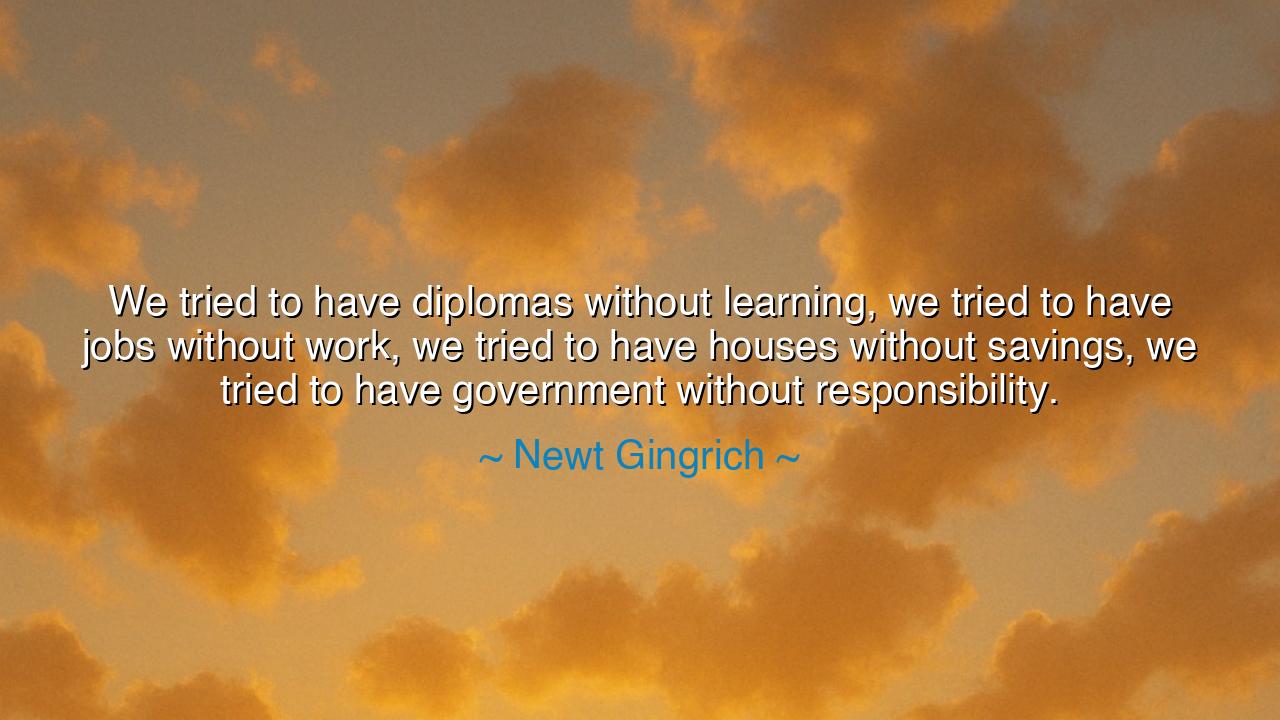
We tried to have diplomas without learning, we tried to have jobs
We tried to have diplomas without learning, we tried to have jobs without work, we tried to have houses without savings, we tried to have government without responsibility.






In the voice of warning that echoes across the ages, Newt Gingrich declared, “We tried to have diplomas without learning, we tried to have jobs without work, we tried to have houses without savings, we tried to have government without responsibility.” These words are not merely political—they are prophetic. They speak of a civilization that sought the fruits of labor without the toil of the field, the crown without the battle, the harvest without the planting. It is a lament for a society that has forgotten that all enduring things are built upon effort, discipline, and sacrifice. For the ancients knew: to remove labor from reward is to unweave the very fabric of virtue.
To seek diplomas without learning is to value the shell and discard the seed. Knowledge, in its purest form, is earned through curiosity, humility, and the struggle against ignorance. The diploma, when divorced from wisdom, becomes a hollow symbol—paper without meaning, a crown worn by one who has not fought. In ancient Athens, the philosopher Socrates taught not to memorize but to think, not to display knowledge but to embody it. Yet when a people begin to chase the appearance of learning rather than its light, they build temples of education that produce only shadows of understanding. Such a world praises form over substance, and in doing so, loses the power to discern truth from illusion.
Then comes the cry for jobs without work, a hunger for security without effort. This is the corruption of the spirit that once drove humanity to build, invent, and endure. Labor, though it wearies the body, ennobles the soul. To work is to contribute to the harmony of creation, to transform potential into reality. Consider the craftsmen of old—the masons who carved cathedrals not for pay alone, but for glory eternal. They knew that work was sacred, that every stone carried their soul’s signature. But when men seek comfort without contribution, they drain the well from which future generations must drink.
The desire for houses without savings is the illusion of permanence built upon sand. The wise know that every structure must rest upon preparation. In the days of Pharaoh, Joseph rose to power not by cunning, but by foresight. He saved grain in years of plenty so that Egypt might live in years of famine. Yet in the modern heart, there grows a restless impatience—a belief that one may possess before earning, consume before creating. This impatience leads not to abundance but to collapse, for no man or nation can spend what has not yet been gathered.
Most perilous of all is the ambition for government without responsibility. For a people may forgive ignorance, they may endure hardship, but they will not long survive the decay of accountability. Leadership without conscience is like a ship without a compass—powerful, but lost. History has seen this many times: the Roman Republic, once strong and wise, fell into ruin when its leaders sought power without duty, spectacle without service. The Senate that once defended liberty became a theater of vanity, and the empire that ruled the world sank beneath its own corruption. Gingrich’s warning is thus an echo of Rome’s ghost—a reminder that when those entrusted with stewardship forget their sacred burden, the state itself begins to die.
And yet, his words are not merely condemnation—they are a call to remembrance. They summon us back to the eternal law: that every blessing has its price, every right its duty, every dream its discipline. To restore balance, we must once again honor the link between learning and mastery, work and reward, saving and security, authority and accountability. These are the pillars of civilization, the virtues that make liberty sustainable.
Therefore, let this teaching be a fire within your heart: seek not the shortcuts that promise ease, for they lead only to emptiness. Study with hunger, labor with pride, plan with patience, and govern your own life with integrity. If each man and woman holds themselves responsible, the world will find its order again. For in the end, prosperity without virtue is decay, and freedom without duty is destruction. But when learning, work, and responsibility walk hand in hand, they become the foundation upon which every great people stand.
So remember this, children of the future: no treasure endures that is not earned, and no civilization survives that forgets the sacred bond between effort and reward. Honor this truth, live it, and you shall build not only a richer world—but a nobler one.






AAdministratorAdministrator
Welcome, honored guests. Please leave a comment, we will respond soon